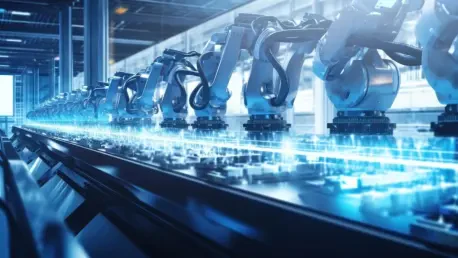Industrial automation is witnessing significant transformations, largely driven by technological advancements and the quest for greater efficiency and productivity. The global industrial controls market is poised to reach an estimated $321.6 billion by 2034. This remarkable growth trajectory represents a compound annual growth rate (CAGR) of 7.6%, shedding light on the factors propelling this trend. Central among these influences is the increasing adoption of automation across various industries. Automation significantly enhances productivity, efficiency, and safety, making it an indispensable element of modern manufacturing and production processes. The emergence of Industry 4.0, which integrates the Internet of Things (IoT), artificial intelligence (AI), and cloud computing into manufacturing workflows, has further amplified the demand for advanced control systems.
Such sophisticated systems facilitate real-time data analysis, proactive maintenance, and effective process optimization, underscoring their critical role in the growth of the industrial controls market. The industry’s evolution aligns with the growing emphasis on energy efficiency and regulatory compliance. Companies are investing in smart control solutions to ensure they meet stringent regulatory standards while minimizing operational costs. The expansion of key industrial sectors such as automotive, oil & gas, pharmaceuticals, and food & beverage further drives market growth. Advancements in robotics and predictive maintenance, alongside the shift towards wireless and remote monitoring systems, are accelerating the adoption of industrial controls, thereby fueling market expansion.
The Dominance of Distributed Control Systems and Programmable Logic Controllers
The Distributed Control Systems (DCS) segment is anticipated to maintain its leadership status within the industrial controls market. As of 2024, DCS held the highest market share due to its widespread adoption in large-scale industrial processes that require centralized monitoring and control. The reliability, scalability, and real-time process automation capabilities of DCS make it indispensable for many industries. These systems offer seamless integration and control of complex processes, ensuring consistent performance and safety. DCS solutions are particularly favored in industries such as oil & gas, power generation, chemicals, and water treatment, where precise control over distributed processes is paramount. The flexibility and robustness of these systems align with the operational demands of these sectors, ensuring optimal performance and minimal downtime.
On the other hand, the Programmable Logic Controllers (PLCs) segment is projected to exhibit astonishing growth, with the highest CAGR of 9.0%. PLCs’ versatility, ease of programming, and adaptability to various industrial applications contribute to their growing popularity. PLCs are widely used for automating specific processes, machinery, and even entire production lines, making them a staple in modern factories. The ability of PLCs to seamlessly integrate with other intelligent systems and IoT devices further underscores their relevance in the era of Industry 4.0. As industries increasingly move towards smart manufacturing, the role of PLCs becomes even more pronounced. They enable real-time data collection, analysis, and decision-making, fostering a more dynamic and responsive production environment.
Technological Advancements and Sectoral Expansion
One of the key drivers of market growth is the integration of advanced technologies such as AI and IoT into industrial processes. These technologies enable predictive maintenance, reducing downtime and enhancing operational efficiency. AI algorithms can analyze vast amounts of data collected from sensors and control systems, identifying patterns and predicting potential failures before they occur. This proactive approach to maintenance ensures that machinery operates at peak performance, minimizing disruptions and optimizing production schedules. IoT plays a crucial role in connecting devices and systems, facilitating seamless communication and data exchange across the production line. The combination of AI and IoT fosters a more connected and intelligent manufacturing environment, driving the demand for advanced control systems.
The expansion of sectors like automotive, oil & gas, pharmaceuticals, and food & beverage is another pivotal factor contributing to market growth. These industries are increasingly adopting automation to streamline their processes, reduce costs, and enhance quality control. In the automotive sector, automation is used for precision assembly, quality inspection, and real-time monitoring of production lines. The oil & gas industry relies on automation for remote monitoring and control of drilling operations, pipeline management, and predictive maintenance. Pharmaceuticals benefit from automation in areas such as batch processing, packaging, and adherence to stringent regulatory requirements. The food & beverage industry leverages automation for process optimization, quality control, and compliance with hygiene standards. The diverse applications of automation across these sectors underscore its critical role in driving efficiency and competitiveness.
Moreover, the shift towards wireless and remote monitoring systems is accelerating the adoption of industrial controls. These systems enable real-time monitoring and control of processes from remote locations, providing greater flexibility and reducing the need for on-site personnel. Advancements in robotics and predictive maintenance further propel the market. Robotics plays a pivotal role in automating repetitive tasks, improving precision, and enhancing safety in hazardous environments. Predictive maintenance, enabled by AI and IoT, allows for the early detection of potential issues, minimizing downtime and reducing maintenance costs. The combination of these technologies enhances overall operational efficiency, making them indispensable in the modern industrial landscape.
Challenges and Opportunities Ahead
Despite the positive trends, the industrial controls market faces several challenges. High initial investment and maintenance costs can be significant barriers for small and medium-sized enterprises (SMEs) looking to adopt advanced automation solutions. The complexity of integrating new technologies with existing systems and the need for specialized skills to operate and maintain these systems further compound the challenges. However, these obstacles are counterbalanced by numerous opportunities for market expansion. The deployment of IoT-enabled smart industrial controls and smart grid solutions presents a significant growth avenue. These solutions offer enhanced monitoring, control, and management capabilities, ensuring efficient and reliable operations. Smart grids, in particular, enhance energy management and distribution, reducing waste and optimizing resource utilization. Additionally, the focus on securing critical infrastructure from cyber threats drives the demand for robust and secure control systems.
The need for enhanced cybersecurity measures in industrial environments is becoming increasingly crucial as more devices and systems become interconnected. Implementing comprehensive cybersecurity strategies ensures the protection of sensitive data and the integrity of industrial processes. The expansion of the industrial sector in emerging markets also presents significant opportunities. As developing economies continue to industrialize, there is a growing demand for automation solutions to enhance productivity and competitiveness. The adoption of advanced technologies and the establishment of modern manufacturing facilities in these regions contribute to the overall growth of the industrial controls market.
Future Considerations
Industrial automation is undergoing remarkable changes, driven by technological advancements and the pursuit of higher efficiency and productivity. The global industrial controls market is anticipated to reach approximately $321.6 billion by 2034, reflecting a compound annual growth rate (CAGR) of 7.6%. This rapid growth can be attributed to several factors, primarily the widespread adoption of automation in various industries. Automation enhances productivity, efficiency, and safety, making it essential in modern manufacturing and production processes.
The advent of Industry 4.0, characterized by the integration of the Internet of Things (IoT), artificial intelligence (AI), and cloud computing, has further fueled the demand for sophisticated control systems. These advanced systems enable real-time data analysis, proactive maintenance, and efficient process optimization, which are critical to the industry’s expansion.
Moreover, the rising focus on energy efficiency and regulatory compliance has led companies to invest in smart control solutions, aiming to meet stringent standards while reducing operational expenses. The market is also boosted by the growth of key sectors like automotive, oil & gas, pharmaceuticals, and food & beverage. Advances in robotics and predictive maintenance, as well as the shift towards wireless and remote monitoring systems, are propelling the adoption and market expansion of industrial controls.









